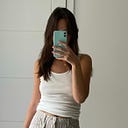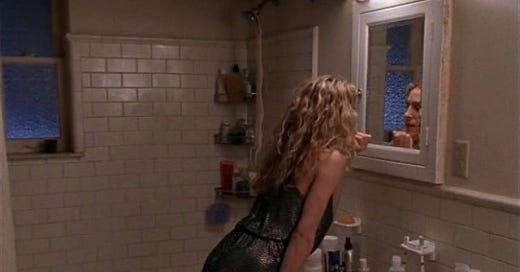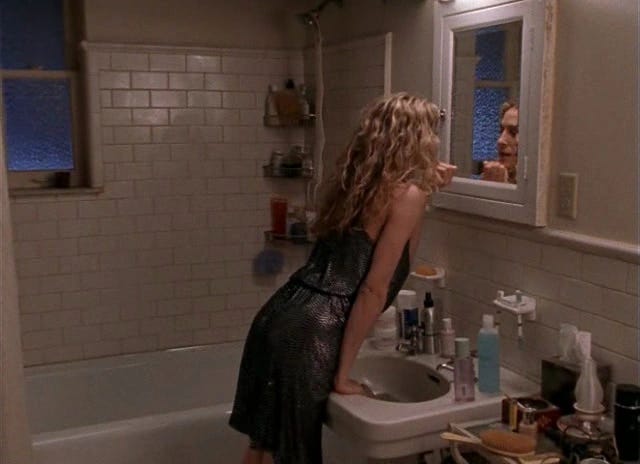

Discover more from Carrie's Column
It was 2014. The word influencer was a brand-new concept, bloggers were selling us SkinnyTea, Kim Kardashian started a contouring movement and Kylie Jenner profusely denied having her lips done.
Instagram was four years old and well on its way to becoming the breeding ground of insecurity that children, teenagers and adults are now totally accustomed to. As a millennial though—and I don’t mean to brag—I already had a few years of crippling insecurity under my belt, from devouring gossip magazines as soon as I could read. Amongst the glossy pages were headlines like:
50 of the best and worst beach bodies!
and
10 celebs who need nose jobs!
I couldn’t deal with being picked apart like that, I used to think. So you can imagine my surprise when I woke up with two hundred thousand extra followers on Instagram. Many of which, were picking me apart.
I’d unexpectedly gone viral overnight. A few months before, I dreamt of working in the film industry, specifically in special effects and prosthetic makeup. Ever since the release of Harry Potter and the Philosopher’s Stone when I was just twelve years old, I believed the goblins who worked in Gringotts to be the most stunning works of art I’d ever seen. But to my surprise after qualifying as a makeup artist, it was really hard to get hold of anyone at Hollywood. So feeling pretty disheartened and bored out of my mind, I started drawing well-known characters on my chin and posting them online.
After these went viral, my career in beauty boomed. I won awards, published a book and got to fly around the world working on international campaigns with globally recognised brands. Comments about my facial features and crooked bottom teeth however, were now a common and somewhat daily occurrence from strangers online. And a few short, but not-so-sweet years later, I’d amassed a long list of cosmetic procedures to tick off my wishlist. I picked my face apart every time I looked in a mirror—literally and metaphorically—until one day in 2018, riddled with anxiety, I decided to pack it all in. Without making any grand announcement, me and my crooked teeth quietly left the Instagram party.
Months came and went, and with them, my shoulders dropped and my jaw unclenched. I started to feel better about my reflection and more importantly, started to care less about futile opinions of my physical appearance.
And yet, it was only last week whilst having dinner with friends, that the topic of cosmetic surgery came up. I initially said I wouldn’t get anything done and one friend said “Even if you had millions of pounds, you wouldn’t get just a little something?” I said “No.” And then, “Well, maybe. Maybe I’d just get my eyelids lifted. And then maybe have the bump on my nose shaved down. And possibly a small chin implant? They could take the fat for that from my cheeks?” Everyone laughed. “I’d get my ears pinned back too,” I added. “But I think maybe that’s it.” The table was silent. “Oh! And I’d fix my crooked teeth.”
It’s fair to say, “beauty” still had a powerful hold on me. So when it came to answering Carrie’s question, I knew I had to sit down and chat with journalist, columnist, beauty culture critic and the woman the beauty industry fears the most—
.Laura: The first thing I want to know is what do you make of Carrie’s question. How powerful is beauty?
Jessica: I think the question is a great one and I think it sort of answers itself because when you take the intangible, poetic idea of beauty out of the equation when it’s not about a breathtaking view and it’s purely about the physical, then physical beauty is power. It’s a metaphor for power. It’s an actual, physical representation of power. That’s what informs what we find physically beautiful and you can see this as you look throughout beauty standards in history. The standards have changed as the people who are in power have changed. Physical beauty as defined by the beauty industry and beauty culture is informed by power hierarchy, by class performance, by markers of wealth. So yeah, I would say beauty is power. I think that often gets misconstrued in a self-help way of beauty is empowering and I would just encourage people to consider the flip side of that. If beauty is power, it means that people without it are powerless—and that’s a very dangerous concept.
Laura: This episode in which Carrie asks how powerful is beauty, aired in 1998. I’m curious to know, what sort of impact do you think growing up in the 90s had on your relationship with beauty?
Jessica: Of course growing up in the 90s had its own particular quirks because beauty culture permeates everything, but also I feel like I was pretty sheltered from beauty culture. I grew up going to catholic school, there were shows I wasn’t allowed to watch, and music I wasn’t allowed to listen to, so I think I was pretty sheltered from 90s beauty trends in a very visible way until I was a little bit older. I think the “heroin chic” thing permeated no matter how sheltered you were, even in religious settings, thinness is the ideal. So I think that shaped a lot of how I viewed beauty. And then I think the rise of digital culture throughout the 90s and early 00s is the biggest influence. Our generation started conducting lives online in our formative years and that online presence has impacted beauty in that it collapsed this divide between regular people and celebrities. Because of that collapse, I think beauty standards have gotten stronger because it democratised this idea of what a model is supposed to look like. Those standards are now applied across the board. We’re all expected to look the same way and that pressure—particularly for our generation—started from the rise of being online.
Laura: You’re so right. I have this theory that the beauty industry's initial focus was to make us insecure. And then as social media blew up, I imagine them all sitting in a board room and someone saying right, the insecurity campaign was a huge success, but how can we take that even further so these women buy all our products? And someone else jumps in and says, we should make them gullible! And now we’ve got this generation of women who are insecure and gullible, which is the beauty industry's ideal audience!
Jessica: It’s so funny that you say that because I read something the other day that said millennials are super aware of marketing influence and maybe that’s true in some sense, but I do also feel like we’re not super aware that everything is marketing. Especially in beauty. We’re completely gullible to marketing. We inherently trust marketing claims when it comes to beauty, skincare and cosmetic procedures. Most millennials who are interested in beauty are not doing the critical thinking work of investigating marketing claims. We are taking them at face value and digesting and integrating them into our lives and then constructing a lot of our identity around them, without awareness.
Laura: I remember when I first joined Instagram, ads never had to be disclosed and I stumbled on a post by a British reality TV star, sharing a collagen drink that she allegedly drank every morning which was the reason for her glowing skin. I immediately ordered three months’ worth!
Jessica: Right! I think it speaks to how powerful beauty is because the potential of what is available to us if we do become beautiful is so great, that it overshadows any sort of scepticism or intellectual interrogation of the things that we’re buying. Beauty is such a source of power that we’re willing to forgo rational thought in order to hopefully, maybe, one day, attain it.
Laura: And what sort of influence do you think that has on us on a personal and emotional level?
Jessica: I think it has an immense influence. Something that’s concerning to me that’s existed for a long time but brands are honing in on right now, is the conflation of the making of the body and face, with the making of the self. We are seeing all sorts of identity language, self-care language, self-love language, being used to describe tools of physical beauty. Tools that do not reach the self or the soul. Taglines like Because you’re worth it, that sell physical beauty products and position those products as a portal to self-worth. The rise of the self-care industry is mostly skincare, so it’s positioning the self as the skin. I think that’s really dangerous and I think we’re all falling for it. A great example of this is the reactions I get when I critique the beauty industry. People get upset and defensive and I think it’s because so many of us identify so deeply with industrialised beauty. We’ve accepted its message that your beauty is your identity, that your beauty is your worth and when someone critiques that industry or critiques those tools, it feels like you are being critiqued or attacked. One example that’s interesting is book stores will stock beauty guides or makeup guides, do you remember Bobbi Brown's Teenage Beauty book?
Laura: Oh don’t, I published a book like that!
Jessica: Well those will end up in self-improvement sections! So it’s really on an intellectual, academic level. There are all of these illustrations of how intertwined the idea of beauty and self really are. I think that has a massive impact on our brains and on our wellbeing.
Laura: So as individuals, what role can we play in dismantling that?
Jessica: I think we owe it to ourselves and others to examine our own beauty beliefs and behaviours. Working in the beauty media has made me appreciate the way that individual behaviours can shape beauty culture. What gets covered by the beauty media is completely inspired by Search Engine Optimisation and clicks. SEO will inform what a publisher will cover and that means that there’s proof that consumers are searching and googling something. So really, our interests and Google searches inform what gets covered. If we can shift those behaviours, we can shift media coverage in a small way. Clicks also inform what gets covered and what gets attention in the media, so if there’s something you’re hate-clicking on or curiosity-clicking on, but you’re not actually interested, those clicks add up and inform what gets the most attention and what trickles down into being a trend. Being conscious of the things that we’re searching for and clicking on, creates the media that creates the culture.
Laura: That kind of suggests that we do hold quite a lot of power as individuals then?
Jessica: Yes, I think we do. Of course, it’s debatable. There are corporate powers at play in everything, but I think it’s really dangerous to discount the power of individual action, especially because individual action is the basis of collective action. But of course I think the consumer has power, especially in what they buy. I think if we collectively decide to divest from the beauty industry just a little bit, that of course would change the beauty industry. These products aren’t being produced for no reason, they’re being produced because we buy them and because it’s profitable.
Laura: Would you say that’s the biggest thing you want people to gain from your work?
Jessica: The biggest thing I want people to gain from my work is that the beauty industry positions itself as this empowering force, this force for self-confidence, self-expression, self-care and self-love, but when you look at the data, it’s having the exact opposite effect on us. Instances of appearance-related anxiety, depression, facial dysmorphia, body dysmorphia, disordered eating, obsessive thoughts, self-harm and even suicide are rising in lockstep with the amount of beauty products and procedures that are available to us. So I hope the thing that people take from my work is that beauty isn’t delivering on its promises. And although it can confer a certain power, it is disempowering us on an existential level. I think if you are at least aware of the ways in which the beauty industry is siphoning your time, money, effort, headspace and personal sense of self, then you’re more likely to make considered decisions about when you want to participate in beauty standards and when you want to put in the effort to divest from them. I hope my work encourages people to divest as much as they can, whenever they can.






Like a lot of people, I’ve gained weight as I’ve aged. I’ll find myself thinking how ugly I look and have to stop and remind myself that I don’t have to be pretty. It doesn’t have to be the thing I bring to the table. I’m hard working. I’m funny. Im smart. I’m loyal. There’s plenty of reasons people like me and it isn’t because of how I look. And reminding myself of that makes it easier to stop obsessing about my appearance for a little while. If I’m not around people who I’m interested in romantically/sexually, then what does it matter how I look? But my initial, knee jerk reaction to anything is always appearance. Then I can move on to healthy thoughts.
Love love loved chatting with you for this!!